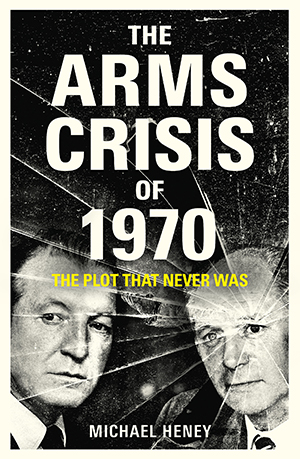THE ARMS CRISIS OF 1970: the plot that never was
Published in Book Reviews, Book Reviews, Issue 5 (September/October 2020), Reviews, Volume 28MICHAEL HENEY
Head of Zeus
£16.99
ISBN 9781789545593
Reviewed by Thomas Leahy
Thomas Leahy is the author of The intelligence war against the IRA (Cambridge University Press, 2020) and lectures on the Northern Ireland conflict and peace process at Cardiff University.
 Various authors have suggested that the Arms Crisis and subsequent trials were turning points in modern Irish history. They explain how between August 1969 and May 1970 civil war could have descended from the North, after rogue members of the Irish government and military allegedly tried to arm northern nationalists in order to end partition. The accused included Fianna Fáil’s Charles Haughey and Neil Blaney, along with Captain James Kelly. Taoiseach Jack Lynch allegedly intervened to foil the plot.
Various authors have suggested that the Arms Crisis and subsequent trials were turning points in modern Irish history. They explain how between August 1969 and May 1970 civil war could have descended from the North, after rogue members of the Irish government and military allegedly tried to arm northern nationalists in order to end partition. The accused included Fianna Fáil’s Charles Haughey and Neil Blaney, along with Captain James Kelly. Taoiseach Jack Lynch allegedly intervened to foil the plot.
In contrast, Michael Heney, a former RTÉ journalist and producer who recently received a doctorate, provides an empirically rich and compelling book questioning this narrative. He cross-examines a wealth of sources, including new and previously released archival, interview and memoir material, and explores the views of personnel from high politics, including Jack Lynch, Charles Haughey and Minister for Defence James Gibbons. He compares their views with perspectives from others who participated in the crisis, such as the jurors and Captain Kelly. Convincing assessments of individual perspectives emerge from this consistent cross-referencing of sources.
Ultimately, Heney outlines Lynch’s ‘hidden policy on Northern Ireland’. This covert policy partly ‘involved the provision of guns—in emergencies—to Northern nationalists’ (pp 6–7). Arms were for ‘defensive and humanitarian purposes’ if civil war erupted after August 1969 (p. 326). Lynch only acted against these plans after Fine Gael’s Liam Cosgrave revealed a Garda note about arms importation attempts by certain ministers on 5 May 1970. Blaney, Captain Kelly, Col. Michael Hefferon (director of military intelligence) and Haughey became ‘scapegoats’ at the trials, which failed to convict anyone (p. 328). Lynch’s paramount concern was ‘to keep Fianna Fáil in power, keep the Opposition parties quiet and, possibly, keep the British government at bay’ (p. 329).
There are chapters focusing on key individuals, including Captain Kelly, Haughey, Blaney, Lynch, Peter Berry (Department of Justice secretary), James Gibbons and Col. Hefferon. Other chapters examine key events, including the arms trials. This structure enables readers to understand what motivated key players during the unfolding crisis. It also complements Heney’s captivating investigative writing style by evaluating the characters behind the events.
His contextualisation of events makes the arguments persuasive. The British government’s lethargic reaction to the northern crisis and its ‘refusal to allow’ Dublin ‘any kind of advisory or consultative role’ created ‘pressures on Lynch … to develop … contingency planning’ (p. 32). Lynch’s cabinet wanted to end partition, but they rejected forcing unification through armed methods because it could provoke civil war. Nevertheless, if northern violence escalated and the British Army either did not or could not protect northern nationalists, Fianna Fáil, as a self-styled republican party, would intervene. To act otherwise would diminish their credibility in the eyes of nationalists. This view interacts with contemporary legacy debates about the Irish government’s role in the outbreak of the conflict. Lynch’s secret arms policy emerged following the British government’s rejection of working with Dublin. It did not represent an attempt by Fianna Fáil to break partition by stealth.
Despite Fine Gael’s Liam Cosgrave thwarting the arms policy, Heney highlights the ‘dismal record’ of opposition parties (p. 332). He suggests that Cosgrave knew from the leaked Garda report about other cabinet members’ involvement but did not publicise this knowledge, and explains how this inaction contributed to the unfair singling out of Captain Kelly in particular for prosecution. Furthermore, Heney’s argument alludes to the wider question of the Irish government’s and opposition parties’ attitudes towards the Northern Ireland conflict.
Some fascinating themes in the book could have been further developed. Heney’s evidence shows that there was no significant division over northern policy within the Fianna Fáil cabinet but that disputes between different arms of the State did emerge. The Gardaí and Berry were suspicious of Gibbons and Lynch. The attorney general issued charges before the Gardaí had finished interviewing all suspects. Were these divisions there before or because of the Arms Crisis? Heney could also have commented more on why Lynch was afraid that the British State would discover covert Irish government plans for a civil war scenario. Had the British government ever specifically warned Lynch not to arm northern nationalists under any circumstances? After all, the British government themselves planned worst-case scenarios during the 1970s. Examples include civil war, re-partition and withdrawal (see pp 50–3). They may have appreciated the fact that all governments need contingency plans.
Nonetheless, Heney has produced an exceptional and thorough book. It is essential reading on the Arms Crisis and the Irish government’s initial reaction to the northern conflict. His compelling evidence shows that the Arms Crisis should be seen for what it was: an attempt by Lynch to protect his government. It also, however, implicitly signalled to beleaguered nationalists in the North that the Irish State would do exactly what Lynch said it would not do in August 1969: stand idly by. Heney explains that this sense of desertion contributed to a sizeable minority of northern nationalists turning towards the Irish Republican Army. Perhaps this is the principal (even if unintended) legacy of the Arms Crisis.
















